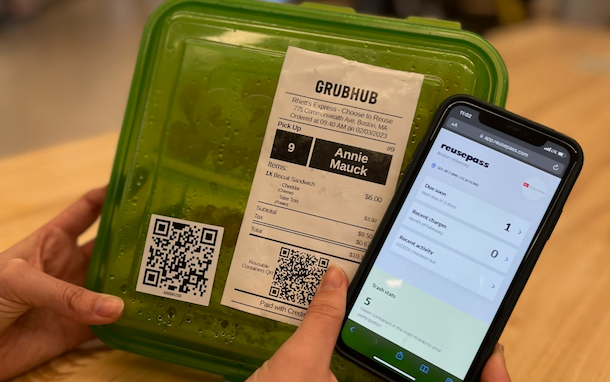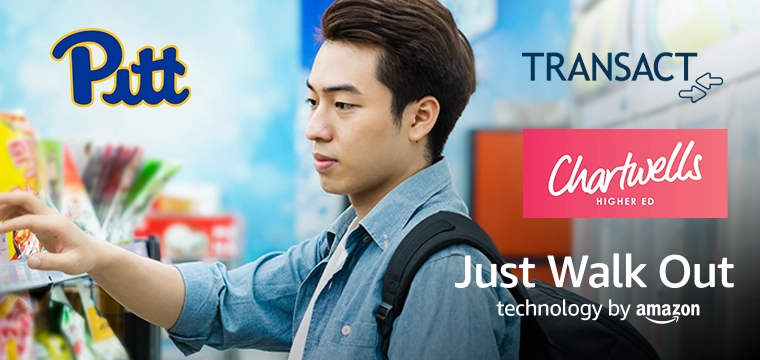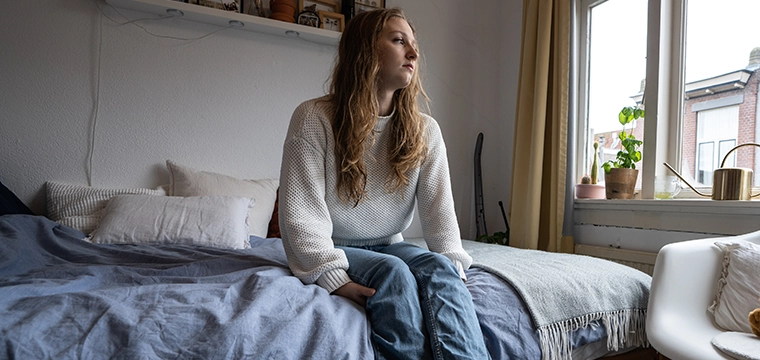
Partnership takes container agnostic approach to reuse program
Reusable containers have grown in popularity on campuses nationwide in recent years, bringing a sustainable alternative to the often wasteful business of single-use boxes. Now, one of the largest providers of mobile ordering solutions for higher education, Grubhub, has entered the reusable container fray following its recent partnership with Topanga.io.
Topanga.io is a Southern California start up that has spent the last year making inroads in the higher ed market. The company has taken a slightly different approach to the now familiar reusable container idea, opting for an agnostic, software-first approach.
CampusIDNews recently caught up with both Grubhub and Topanga.io to discuss what the partnership means not just for Grubhub university clients, but for campus dining as a whole.
Where Topanga.io adopts a different approach to reusable containers is in its willingness to be a technology company, rather than a container company.
“We’ve recognized the need for technology in order to scale sustainable, long-term reuse programs,” says Page Schult, Co-Founder and CEO of Topanga.io. “We’ve been working in the higher ed space for the past year now, along with clients in meal plan and grocery delivery.”
Schult credits the company’s technology-first nature for offering a seamless integration experience to provide reuse across a range of retail and residential locations.
“We started talking about a potential partnership with Grubhub at the end of 2022 around two of our biggest clients, Ohio State University and Boston University,” she adds. “Both are avid Grubhub campuses and both had been looking at ways to make a reuse program come to life within their Grubhub environments.”
Boston University was used as proving grounds to test proof of concept for the other notable feature of the Grubhub and Topanga.io partnership: reusable containers in retail dining.
We see this as being a solution for all sorts of campus dining locations, be it retail, residential or even catering.
Historically, reusable containers on college campuses have been used almost exclusively for residential, university-operated dining halls. But as this partnership has proven, orders placed at retail locations can be served in reusable containers, too.
“We see this as being a solution for all sorts of campus dining locations, be it retail, residential or even catering,” says Ben Anderson, director of strategic sales for Grubhub. “Because this is something that’s an easy add on to the existing Grubhub platform, we believe this will scale up very quickly.”
There are different workflows for reusable containers in retail dining versus residential dining. In retail use cases, order tickets are printed with a QR code that labels it a Topanga.io reusable order.
“In residential dining applications you’re not necessarily ordering the food, you’re ordering the container,” says Anderson. “But you’re still leveraging the Grubhub app so that you have a way to process the transaction, run it against the campus card system, and ensure you have a credentialed customer picking up the order.”
Grubhub has also built out a “lite” enterprise model for campuses that just want to test reusable containers in residential dining. “It’s ideal for those who don’t necessarily want all of Grubhub mobile ordering, but instead want to take a focused approach initially with the option to upgrade later to the full mobile ordering platform,” says Anderson.
We can pair reusable containers with robot delivery, or place the containers in pickup lockers. That’s the key for us with Topanga, it works with the Grubhub platform and enables us to tie in our existing industry partners more seamlessly.
Another benefit to the reusable container system is that it dovetails with existing Grubhub services. “We can pair reusable containers with robot delivery, or place the containers in pickup lockers,” says Anderson. “That’s the key for us with Topanga, it works with the Grubhub platform and enables us to tie in our existing industry partners more seamlessly.”
“It enables us to have more arrows in the quiver for universities to choose from and helps ensure we’re aligned with how we build out our contactless, digital ecosystem,” adds Anderson.
Another key difference between Topanga.io and some of the reusable container programs that have come before is means of container reconciliation.
“A lot of the previous reuse programs in higher ed have leaned on outdated, analog systems for container checkout and return,” says Schult. “Most students have their mobile phone with them, so with our integrated ReusePass x Grubhub offering, they just open their Grubhub app. Each participating location within the Grubhub app will inform the user that it offers reusable containers as an option.”
In retail dining environments, where orders are fulfilled back of house and placed on a shelf for pickup, the connection between a student and a container is done by the operators back of house, explains Schult. “Once the container is on the shelf, the student doesn’t need to scan anything or show an ID, they just pick up the container and leave.”
A lot of the previous reuse programs in higher ed have leaned on outdated, analog systems for container checkout and return. With our integrated ReusePass x Grubhub offering, students just open their Grubhub app.
Students then receive a text informing them where to return their container. Student’s can check their Topanga.io ReusePass account at any time to see their impact stats and how to return containers. All containers are scanned and marked as returned by Topanga.io’s ScanApp system at the time they are cleaned and sanitized for their next use.
Students can also have as many containers checked out at a given time as they want.
Students have a certain amount of time to return the containers, they will receive SMS messages to remind them of that return window, and then beyond that a campus can choose to assess a late fee. “We haven’t seen any more than three containers checked out by a single student at a given time,” says Schult.
“Each container we use is paired with a unique identifier using either a QR code or RFID,” says Schult. “That allows us to check out a specific container to a specific user and track that asset throughout its lifecycle.”
Another unique facet to Topanga.io’s reusable formula is that the company is container agnostic.
“We’ll work with any container manufacturer that the university wants to use,” says Schult. “If the university doesn’t have a preference, we have a network of preferred partners that we’ll work with based on the type of container needed and the program.”
Being container agnostic is a stance that Grubhub shares. “We know that campuses are all in different boats in terms of their wants and needs,” says Anderson. “When it comes to reusable containers universities either don’t have it and want an all-inclusive offering, or they do have it and want a system that’s compatible with what they’ve already invested in.”
A huge benefit of the Topanga and Grubhub partnership is that we're able to support an existing reuse program, or help campuses start a new one.
It’s this level of flexibility that has Anderson excited for the future of the program.
“This is a cool way for retail dining to replace the non-reusable containers, use whatever container they want to use, and even possibly brand those containers,” he says. “That’s a huge benefit of the Topanga and Grubhub partnership — we're able to support an existing reuse program, or help campuses start a new one.”
One of the first campuses to deploy the Topanga.io and Grubhub partnership is Boston University. Lexie Raczka, Director of Sustainability for Boston University Dining Services at Aramark, offers some insights into how the program got off the ground and how things are going since launch.
“When we were developing the Choose to Reuse program, we knew we wanted a system that had detailed tracking to monitor the participation and success of the program. We also needed a solution suitable for a contactless pickup environment,” says Raczka. “The detailed level of data that Topanga provides, as well the support of a contactless pickup environment via Grubhub, made the program possible.”
BU had been trying for quite some time to find a winning reusable solution that also worked with its Grubhub environment.
“We spent more than two years working on a reusable to-go solution for our retail food hall, where we implemented Grubhub ordering and contactless pickup,” explains Raczka. “Grubhub’s integration with Topanga allowed us to offer a reusable to-go program that operates seamlessly within our existing ordering process.”
Grubhub’s integration with Topanga allowed us to offer a reusable to-go program that operates seamlessly within our existing ordering process.
In addition to launching the right solution, Raczka stresses the importance of encouraging the campus community to actually leverage the service.
“We still offer disposable containers in our retail food hall, but there is a $2.50 surcharge associated with disposables to nudge people towards reusable dishware for dine-in or a reusable to-go container,” says Raczka. “This surcharge has been instrumental in shifting people’s behavior from single-use packaging towards reusables. I would highly encourage other universities that want to offer disposable containers to consider a similar surcharge.”
Feedback from BU students suggests that the program is on the right track, and Raczka has the stats to back it up.
“Students have been very receptive to the program, and commonly share that it’s so easy to participate in the program,” says Raczka. “Since we launched the program, over 7,700 individuals have placed a reusable to-go order, and we have issued more than 45,000 reusable to-go containers, with a 97% return rate.”
Ultimately, sustainability remains at the heart of the Grubhub and Topanga.io partnership.
“Sustainability is clearly top of mind for our university partners,” says Anderson. “So as a technology consultancy, the question for us is how can we help our campuses navigate those concerns.”
The point of what we’re doing at the end of the day is to showcase that there’s true, positive economic and environmental impact from using a data driven reusable program.
Schult echoes the underlying importance of the initiative. “The point of what we’re doing at the end of the day is to showcase that there’s true, positive economic and environmental impact from using a data driven reusable program,” she says.
And while the use of reusable containers in retail dining is a new and exciting development, as Anderson explains, partnering with Topanga.io is about more than providing cool tech for cool tech’s sake.
“I think that there are some innovations that we bring to the market that may be applicable in limited use cases – lockers and delivery robots might not be a fit for every type of campus environment,” says Anderson. “But I think that reusable containers are something that could be a fit for everyone.”




